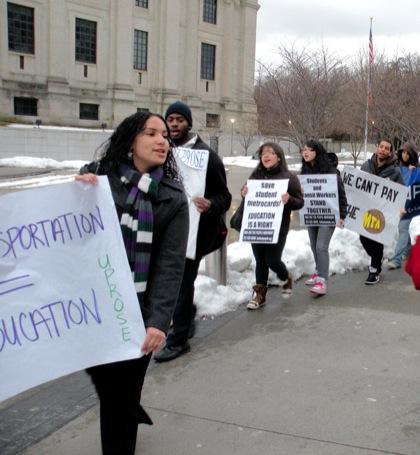A hearing on proposed Metropolitan Transportation Authority service cuts devolved into chaos after a woman — who tried to speak without first being called to the microphone — was arrested.
The removal from the room of the woman stirred others in the crowd to respond, and before the melee ended, a total of four people had been arrested by MTA police officers, charged with disorderly conduct and resisting arrest.
The hearing was held in the Brooklyn Museum’s Cantor Auditorium.
The woman appeared to be returning to her seat when she was taken into custody, said Olukemi Ilesanmi, who was sitting in the row behind,and who told this paper that she had followed the woman and arresting officer from the room.
“My reaction was, someone needs to be following them, and when I didn’t see anyone else, I ran out,” Ilesanmi went on. “I stood far enough away so that I was not obstructing the police, but I made it clear that I was there deliberately, watching.”
What she saw shocked her. To get the woman out of the auditorium, said Ilesanmi, the officer, “Kind of grabbed her, and started pulling her toward the back. Once they were outside, he turned her and started handcuffing her. I was pretty stunned because I wasn’t expecting that. I said, ‘Why are you doing this? Do you really have to treat her that roughly?’ He didn’t respond to me, ever.”
Then, said Ilesanmi, two other police officers arrived. “She started saying, ‘Do you really need three people to do this?’” Ilesanmi reported.
Before the arrest, Christopher Boylan, deputy executive director of corporate affairs and communications for the MTA, tried to get the woman to leave the microphone, telling her that there was a “process” that those who were speaking had followed, heading to the microphone only after their names were called.
But, earlier, City Councilmember Darlene Mealy had arrived and taken the microphone, without first being called on to speak. She was allowed to make her comments without admonition. Earlier, members of the crowd had protested because few private individuals had been called on, while there was a constant parade of elected officials and their representatives.
All who spoke blasted the MTA’s plans, made to close an estimated $750 million budget gap. Among the cuts affecting Brooklynites are the elimination of bus and train lines, and reduction in frequency of service, particularly at night and on weekends. In addition, plans to eliminate student MetroCards and deep cuts proposed for the Access-a-Ride program, drew outrage from speakers at the hearing.
“We want the MTA to stop pretending riding the subways and buses is a privilege,” asserted City Councilmember Jumaane Williams. “It’s a right.”
“Does this amuse you?” demanded Mealy. “Because every year, you do the same thing over and over. You should all do better. It’s a sad day.”
Earlier, outside the museum, NYC Students for Transportation Justice and UPROSE protested the elimination of student MetroCards, chanting, “We need our pass to get to class,” and “We can’t pay the MTA.”
Concerns expressed by the protesters, as well as by numerous speakers at the hearing is that families will be unable to afford the approximately $1,000 per child it would cost each year for students who use public transportation to get to school, and that, as a result, there would be an increase in the drop-out rate.
“We’re fed up,” contended City Councilmember Letitia James. “We’re tired of miscalculation. We’re tired of misjudgment. We’re tired of two sets of books. We’re tired of being held hostage, and now you want to hold our children for ransom. Enough is enough.”
“They say you judge a society by how it treats its most vulnerable,” noted Henry Butler, the chair of Community Board 3. “What do the cuts that are proposed say about us morally as a society?”
The reduction in bus service would devastate the neighborhoods he represents, said City Councilmember Vincent Gentile. “You’re looking at numbers, not people,” he charged. “By all accounts, you didn’t look at demographics. By all accounts, you ignored the number of seniors in Bay Ridge, Bensonhurst, Dyker Heights and Bath Beach. Many of these seniors can’t access subway platforms comfortably if at all. They rely on buses to travel locally, and that reliance has got to be respected and accommodated.”
To bridge the budget divide, speakers offered numerous suggestions, including utilizing 10 percent of federal stimulus funds for operating expenses, as well as getting rid of unused MTA property. In addition, Borough President Marty Markowitz contended, “The MTA has a decision to make. It has to decide whether it is appropriate in this crisis to fund flashy ‘cosmetic’ mega-projects in places like lower Manhattan while starving the system as a whole, or whether it makes more sense to strategically and temporarily redirect funds to preserve jobs, safety and reliability in the system.”
But, said MTA Spokesperson Kevin Ortiz, the authority doesn’t want to divert capital funds to operations, calling such a move, “A stop-gap measure that would exacerbate problems in the future.” As for disposing of unused MTA property, Ortiz said that the authority has proposed rehabilitating that building, and had put $184 million into its new capital plan for that purpose. The MTA, he added, is “in the process of submitting a new capital plan,” because the original one had been rejected by the state legislature.























